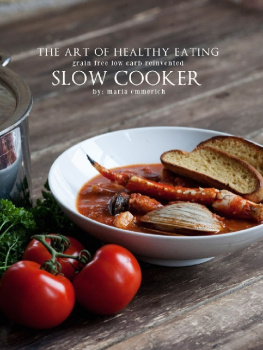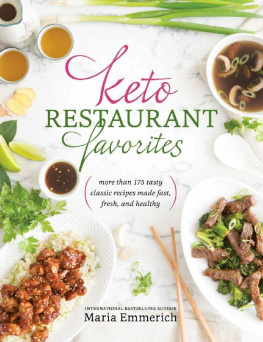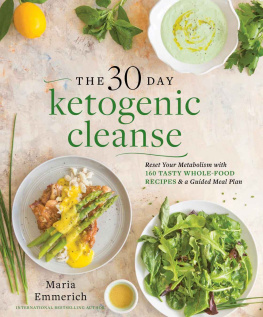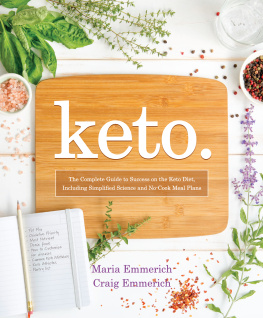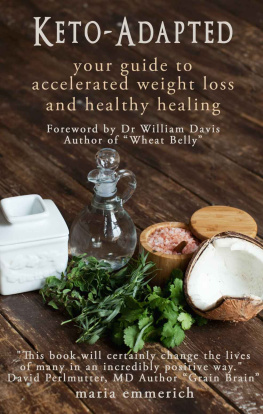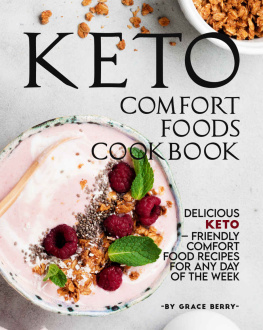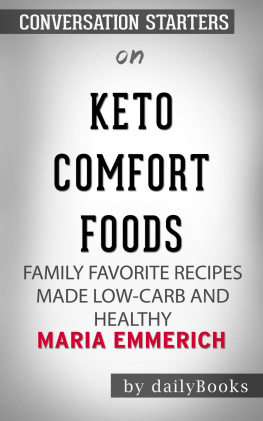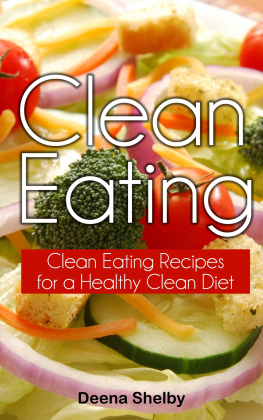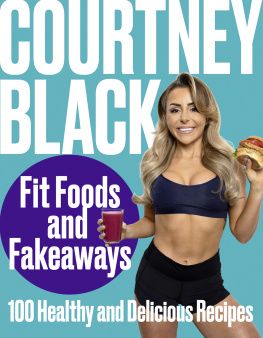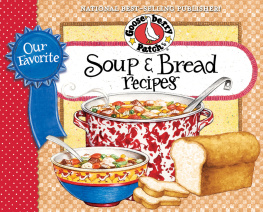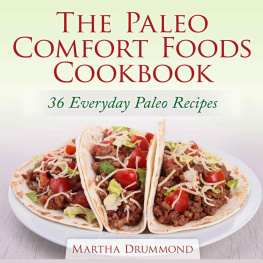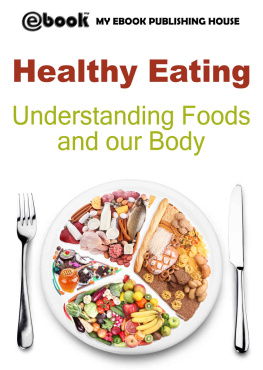Maria Emmerich - The Art of Healthy Eating - Savory
Here you can read online Maria Emmerich - The Art of Healthy Eating - Savory full text of the book (entire story) in english for free. Download pdf and epub, get meaning, cover and reviews about this ebook. year: 0, genre: Home and family. Description of the work, (preface) as well as reviews are available. Best literature library LitArk.com created for fans of good reading and offers a wide selection of genres:
Romance novel
Science fiction
Adventure
Detective
Science
History
Home and family
Prose
Art
Politics
Computer
Non-fiction
Religion
Business
Children
Humor
Choose a favorite category and find really read worthwhile books. Enjoy immersion in the world of imagination, feel the emotions of the characters or learn something new for yourself, make an fascinating discovery.

- Book:The Art of Healthy Eating - Savory
- Author:
- Genre:
- Year:0
- Rating:4 / 5
- Favourites:Add to favourites
- Your mark:
- 80
- 1
- 2
- 3
- 4
- 5
The Art of Healthy Eating - Savory: summary, description and annotation
We offer to read an annotation, description, summary or preface (depends on what the author of the book "The Art of Healthy Eating - Savory" wrote himself). If you haven't found the necessary information about the book — write in the comments, we will try to find it.
The Art of Healthy Eating - Savory — read online for free the complete book (whole text) full work
Below is the text of the book, divided by pages. System saving the place of the last page read, allows you to conveniently read the book "The Art of Healthy Eating - Savory" online for free, without having to search again every time where you left off. Put a bookmark, and you can go to the page where you finished reading at any time.
Font size:
Interval:
Bookmark:
Table of Contents
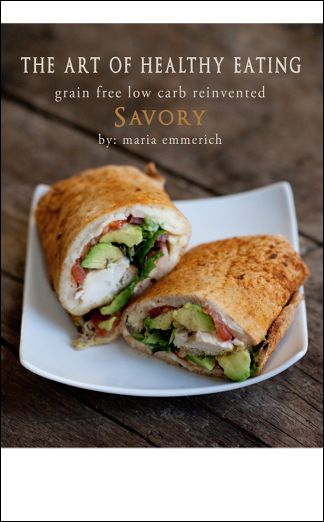

Thank You
I once heard someone say, If you want to hear God laugh, tell him what you have planned! That statement couldnt have been more true for the past few years of my life. I was a planner, and the more I tried to control how things happened, the more frustrated I got. My husband lost his job, my job as a rock-climbing guide didnt pay the bills and we struggled to start our family. All of these trials helped inspire my nutrition business. Throughout this journey I have been able to befriend some amazing people that I need to thank.
Rebecca: I remember meeting you for the first time in Body Pump! Your talent as an artist is amazing! Thank you for all your support and encouragement. This book layout is all Rebecca!
Micah and Kai: We were always meant to be together. I know it sounds crazy, but we are soul-mates. Micah will do something and Craig will look at me and say, Oh my, he takes after you! And Kai is quiet like me with a passion for being outdoors with nature. My life is so full with them in my life. My Ideal Day is cooking for them in the kitchen all day and hearing, Mommy, try.
Jamie: I remember when you first approached me, Maria, I love your book, but you need a new cover! Your photography is indescribable! Thank you for the covers of all of my books! I also want to thank you for helping me start my blog; it helped me get up in the morning when I was going through the most difficult time in my life!
Craig: To my love and best friend. Without your technical skills, patience, editing, encouragement and APPETITE, none of this would have happened. SHMILY.
Copyright 2012 by Maria Mind Body Health LLC
Why We Get Fat
I grew up with a passion for sports as well as food; my body shape revealed my two loves. I was athletic yet fat. How to lose weight was a complicated puzzle for me, but once I found the right pieces to fit the hormone puzzle, it became easy. I learned the secrets of the hormone insulin and the lesser known hormone leptin, that by adopting a very low-glycemic, high-fat (not just high-protein) diet, I had re-sensitized my biochemistry to these essential hormones, which turn off severe food cravings. Best of all, my diet makeover required a lot less self-deprivation than previous diets that didnt stimulate weight loss. The nutrient-rich, relatively high-fat dietary approach I have developed for myself incorporates exotic, little-known replacements for high-glycemic, starchy foods. This philosophy finally gave me total peace with food; something I never imagined possible. The weight came off, even more than my original goal. Included in this book are exotic, tasty, weight loss foods. The love-hate relationship with food typically starts with innocent dieting and calorie counting, followed by out of control bingeing that causes dangerous extremes, such as skipping meals, obsessive-compulsive exercise, and purging. No wonder food becomes the enemy and we become increasingly frustrated and unhappy as we fight the daily battle. I help clients discover that through proper nutrition education, including how to choose the right foods, they can live a life free from cravings and weight gain.
Before my revelation of the biochemistry of food and our weight, I was so proud of my perfect diet of whole grains, fruits, and fat-free desserts, but I was still puzzled why I had uncontrollable food cravings. By finding the correct supplements to change my biochemical imbalances, I started a high healthy-fat, grain-free, no-starch diet; I finally found peace in my body. I didnt feel deprived or compelled to overeat.
The secret is to control leptin and insulin hormones. Any diet that stops blood sugar and insulin spikes also allows the cells to regain sensitivity to the noteworthy anti-aging, weight and hunger-regulating hormone called leptin. The hardest part is to remove my clients fear of fat, because it is almost impossible to obtain this effect without significant amounts of fat in the diet. High protein alone doesnt work because excess protein will also turn to sugar. Low fat, high protein diets will fail to keep your blood sugar from spiking, and will not allow your leptin hormone to increase. Ron Rosedale, MD, author of The Rosedale Diet and a pioneering scientist on the hormone leptin, states, If you dont get enough fat, you will likely eat too much protein, which then turns to sugar. Do you know what a normal blood sugar level is? 1 cup? 2 cups? NO, 1 TEASPOON of sugar is a normal blood sugar for adults, children, teens and babies. Blood sugar increases insulin and insulin is TOXIC to our bodies and cells.
Insulin and its counterbalancing hormone, glucagon, are in charge of controlling metabolism. The word insulin may immediately call up an association with diabetes, which is totally valid. Controlling blood sugar is insulins most important job. Many people with heart disease, high cholesterol, diabetes and high blood pressure in their families have inherited a tendency for their insulin sensors on the cells to malfunction because of years of high sugar and starch consumption. As these sensors become tired, insulin resistance develops. Since its essential to get the sugar out of the blood and into the cells, the pancreas overcompensates by making more and more insulin to force the tired sensors to work. This starts a detrimental cycle of needing ever more insulin to keep the process going. Some people become so resistant to insulin that the amount necessary to make the sensors respond and clear the sugar from the blood is more than their pancreas can make; that person becomes diabetic.
Excess insulin causes a variety of other detrimental problems: it increases the production of cholesterol in the liver, thickens the walls of the arteries, causing high blood pressure; the kidneys retain salt and fluid, and it tells our fat cells to store excess starch and sugar.
Insulins actions are countered by glucagon. Glucagon alerts the liver to slow down triglyceride and cholesterol production, tells the kidneys to release excess salt and fluid, the artery wall to relax and lower blood pressure, and the fat cells to release stored fat to be burned for energy. Insulin, however, is a stronger hormone than glucagon and when it is high, it suppresses glucagons actions. After a childhood of sugar and starch consumption, metabolic syndrome and insulin resistance happens.
What we eat controls the production of these hormones. This book will teach you how to stimulate glucagon by keeping insulin low, which will allow the metabolism to heal and the malfunctioning sensors to regain sensitivity. Once this healing occurs, the metabolic disturbances caused by elevated insulin will improve or disappear; cholesterol and triglycerides will return to normal, blood pressure returns to normal, blood sugar will stabilize and you will achieve a normal body weight. Theres no need to spend huge amounts of money on medications for band-aid solutions. The affirmative testimonies of my clients support the fact that nutrition is key to a healthy body. You can pay the doctor or you can pay the farmer.
In Gary Taubes book, Why We Get Fat and What To Do About It, a very interesting study conducted by the National Institute of Health, had 20,000 women who were very overweight go on a low calorie diet. On average, the women consumed 360 calories a day less on their diets than they did when they first agreed to participate. If obesity is caused by overeating, then these women were under-eating by 360 calories/day. They ate 20% less calories than what the public-health agencies tell us women should eat. The result? After 8 years, the women lost an average of 2 pounds each! AND their waist circumference increased! Which demonstrates that the women didnt lose fat, they lost muscle. This is why a calorie isnt a calorie! A pound of fat contains 3500 calories. Eating 360 calories less everyday should have had the women lose 2 pounds of fat in the first 2 weeks and more than 36 pounds in the first year!
Next pageFont size:
Interval:
Bookmark:
Similar books «The Art of Healthy Eating - Savory»
Look at similar books to The Art of Healthy Eating - Savory. We have selected literature similar in name and meaning in the hope of providing readers with more options to find new, interesting, not yet read works.
Discussion, reviews of the book The Art of Healthy Eating - Savory and just readers' own opinions. Leave your comments, write what you think about the work, its meaning or the main characters. Specify what exactly you liked and what you didn't like, and why you think so.

